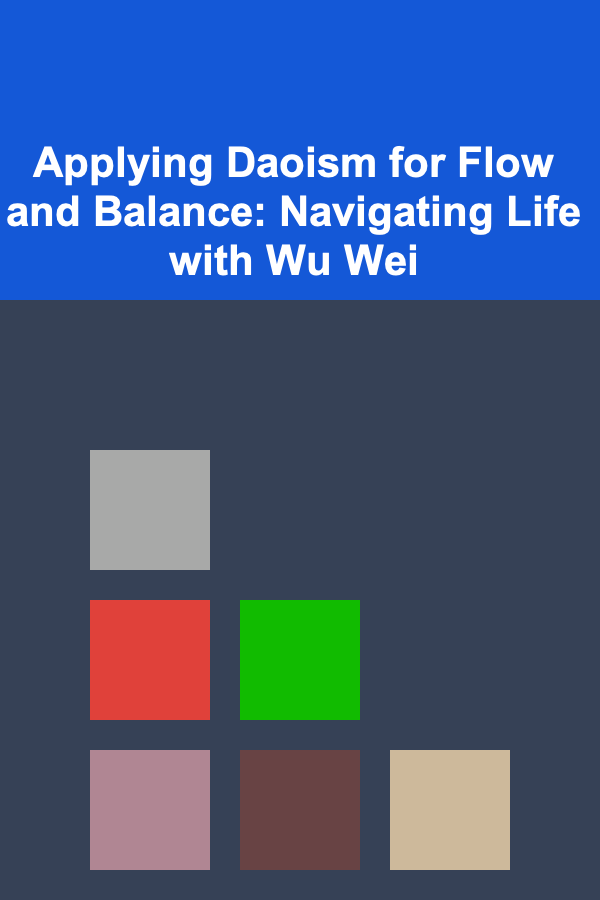
Applying Daoism for Flow and Balance: Navigating Life with Wu Wei
ebook include PDF & Audio bundle (Micro Guide)
$12.99$5.99
Limited Time Offer! Order within the next:

In a world characterized by constant change, relentless competition, and an overwhelming sense of urgency, the ancient wisdom of Daoism offers a profound path to cultivating flow and balance. Daoism, also spelled Taoism, is a philosophical and religious tradition originating in China that emphasizes living in harmony with the Dao (道), often translated as "the Way." This "Way" represents the fundamental nature of the universe, the underlying principle that governs all things. Applying Daoist principles to daily life can lead to a greater sense of ease, resilience, and fulfillment, allowing individuals to navigate the complexities of modern existence with grace and equanimity.
Understanding the Core Principles of Daoism
Before delving into practical applications, it's crucial to grasp the foundational concepts of Daoism. These principles provide the framework for understanding how to cultivate flow and balance in your life.
The Dao (道): The Way
The Dao is the central concept in Daoism. It is often described as the ultimate reality, the source of all existence, and the natural order of the universe. It's not a static entity but rather a dynamic, ever-flowing process. The Dao is beyond human comprehension in its totality, but its effects are observable in the natural world -- the changing of seasons, the growth of plants, the movement of water. Living in accordance with the Dao means aligning oneself with this natural flow, recognizing its inherent wisdom, and allowing it to guide one's actions.
Wu Wei (無為): Action Through Non-Action
Wu Wei is perhaps the most misunderstood, yet most powerful, concept in Daoism. It's often translated as "non-action" or "effortless action," but it's not about doing nothing. Rather, it's about acting in accordance with the natural flow of things, without forcing or striving against the current. It's about letting go of ego-driven desires and allowing the Dao to guide your actions. Wu Wei involves a deep understanding of the situation, a calm and centered mind, and a willingness to adapt to changing circumstances. A skilled archer, for instance, doesn't force the arrow but releases it with precision and timing, allowing it to fly true to its target. This is Wu Wei in action.
"Doing nothing is better than being busy doing nothing." - Lao Tzu, Tao Te Ching
Yin and Yang (陰陽): Duality and Interdependence
The symbol of Yin and Yang represents the interconnectedness of seemingly opposing forces. Yin represents the feminine, passive, dark, and receptive aspects, while Yang represents the masculine, active, light, and assertive aspects. These forces are not in conflict but rather in a constant state of dynamic equilibrium. They are interdependent, with each containing a seed of the other. Understanding Yin and Yang helps us recognize that balance is not about eliminating one side but about harmonizing both. Day and night, hot and cold, success and failure -- all are part of the same continuum, and recognizing their interplay allows us to navigate life's ups and downs with greater understanding and acceptance.
De (德): Virtue and Inner Power
De refers to the manifestation of the Dao within an individual. It's the inherent virtue or power that arises from living in accordance with the Dao. Cultivating De involves developing qualities such as compassion, humility, integrity, and wisdom. It's not about external displays of morality but rather an inner transformation that radiates outwards. When we cultivate De, we become more aligned with the Dao, and our actions naturally flow from a place of inner harmony and strength.
Ziran (自然): Naturalness and Spontaneity
Ziran emphasizes the importance of living naturally and spontaneously, without artificiality or pretense. It encourages us to embrace our true selves and to act in accordance with our inner nature. It's about letting go of societal expectations and external pressures and allowing our genuine selves to shine through. This doesn't mean acting impulsively but rather cultivating a deep self-awareness and allowing our actions to arise from a place of authenticity and integrity.
Practical Applications of Daoism for Flow and Balance
The principles of Daoism can be applied to various aspects of life, from work and relationships to health and personal growth. Here are some practical ways to integrate Daoist wisdom into your daily routine:
Cultivating Mindfulness and Presence
Daoism emphasizes the importance of being present in the moment. This can be achieved through practices such as meditation, mindful breathing, and mindful movement. Meditation allows us to quiet the mind, observe our thoughts and emotions without judgment, and connect with our inner self. Mindful breathing helps us anchor ourselves in the present moment and cultivate a sense of calm and centeredness. Mindful movement, such as Tai Chi or Qigong, integrates awareness of body and breath, promoting both physical and mental well-being. By cultivating mindfulness, we can break free from the cycle of worry and anxiety and experience life more fully.
Embracing Impermanence and Change
Daoism recognizes that everything is in a constant state of flux. Accepting impermanence is crucial for cultivating resilience and navigating life's challenges. Instead of clinging to the past or fearing the future, we can learn to embrace the present moment and adapt to changing circumstances. This involves letting go of our need for control and trusting in the natural flow of life. When we accept impermanence, we become less attached to outcomes and more open to new possibilities.
Finding Your Rhythm: Balancing Work and Rest
In today's fast-paced world, it's easy to become caught up in a cycle of constant activity. Daoism reminds us of the importance of balancing work and rest, activity and stillness. Just as Yin and Yang are interdependent, so too are our periods of action and repose. Schedule time for relaxation, reflection, and rejuvenation. Engage in activities that nourish your mind, body, and spirit, such as spending time in nature, pursuing hobbies, or connecting with loved ones. Recognize that rest is not a luxury but a necessity for maintaining long-term health and well-being.
Practicing Wu Wei in Decision-Making
Applying Wu Wei to decision-making involves letting go of ego-driven agendas and trusting in your intuition. Instead of forcing a particular outcome, observe the situation carefully, listen to your inner guidance, and allow the best course of action to emerge naturally. This requires a calm and centered mind, a willingness to be flexible, and a trust in the unfolding of events. It doesn't mean being passive or indecisive, but rather acting with wisdom and discernment, in accordance with the natural flow of things. Sometimes, the most effective action is to do nothing at all, allowing the situation to resolve itself.
Cultivating Humility and Simplicity
Daoism values humility and simplicity. It encourages us to let go of ego and to live in accordance with our true needs, rather than being driven by external desires and social pressures. Humility allows us to learn from others, to acknowledge our limitations, and to approach life with a sense of openness and curiosity. Simplicity involves decluttering our lives, both physically and mentally, and focusing on what truly matters. By cultivating humility and simplicity, we can free ourselves from the burdens of materialism and ego and experience a greater sense of inner peace and contentment.
Nurturing Relationships with Harmony and Compassion
Daoist principles can be applied to relationships to foster harmony and understanding. This involves practicing empathy, compassion, and non-judgment. Listen attentively to others, seek to understand their perspectives, and respond with kindness and understanding. Avoid conflict and strive for resolution through communication and compromise. Recognize that relationships are a dynamic dance, requiring both give and take. By nurturing relationships with harmony and compassion, we create a more supportive and fulfilling social environment.
Living in Harmony with Nature
Daoism emphasizes the interconnectedness of all things and the importance of living in harmony with nature. Spend time outdoors, appreciate the beauty of the natural world, and learn to respect its rhythms and cycles. Practice sustainable living by reducing your consumption, conserving resources, and minimizing your impact on the environment. Recognize that you are part of a larger ecosystem and that your actions have consequences. By living in harmony with nature, you contribute to the well-being of the planet and cultivate a deeper sense of connection to the universe.
Embracing Imperfection: The Beauty of Wu Wei in Action
Perfectionism is the antithesis of Wu Wei. It strives for an unattainable ideal, creating anxiety and hindering flow. Daoism encourages embracing imperfection as a natural part of the process. A wabi-sabi approach to life, finding beauty in imperfection and impermanence, aligns perfectly with Wu Wei. Accept that mistakes are inevitable and opportunities for learning and growth. Focus on the process, not just the outcome. A potter, for instance, doesn't force the clay into a perfect shape but allows it to guide their hands, embracing the subtle imperfections that give each piece its unique character. This acceptance of imperfection fosters creativity, resilience, and a deeper appreciation for the present moment.
Overcoming Challenges in Applying Daoism
While the principles of Daoism offer a powerful framework for cultivating flow and balance, applying them in practice can present challenges. Here are some common obstacles and strategies for overcoming them:
The Mind's Resistance to Letting Go
The ego is naturally resistant to letting go of control. It craves certainty and predictability and may resist the idea of Wu Wei. To overcome this resistance, practice mindfulness and self-awareness. Observe your thoughts and emotions without judgment, and recognize that they are not you. Gradually learn to loosen your grip on control and to trust in the natural flow of events. Start small, by practicing Wu Wei in simple situations, and gradually extend it to more complex areas of your life.
Societal Pressures and Expectations
Society often pressures us to conform to certain standards of success and achievement, which can be at odds with the Daoist emphasis on simplicity and authenticity. To navigate these pressures, cultivate a strong sense of self-worth and inner conviction. Identify your own values and priorities, and make decisions that align with your true self. Learn to differentiate between your own genuine desires and the expectations of others. Surround yourself with supportive people who appreciate and value you for who you are.
The Difficulty of Accepting Impermanence
Human beings have a natural tendency to cling to the familiar and to resist change. Accepting impermanence can be particularly challenging when faced with loss, disappointment, or uncertainty. To cultivate acceptance, practice gratitude for the present moment and focus on the positive aspects of your life. Recognize that change is inevitable and that even difficult experiences can offer opportunities for growth and learning. Develop a strong sense of inner resilience by cultivating mindfulness, self-compassion, and a belief in your ability to overcome challenges.
Misunderstanding of Wu Wei as Passivity
One of the biggest hurdles is misinterpreting Wu Wei as laziness or inaction. This is a critical misunderstanding. Wu Wei is not about doing nothing; it's about acting from a place of deep awareness and alignment with the natural flow. To combat this, actively engage in self-reflection. Examine your motivations and intentions. Are you avoiding responsibility or are you consciously choosing to allow things to unfold naturally? Seek guidance from experienced practitioners or scholars of Daoism to deepen your understanding of Wu Wei and its practical application.
The Challenge of Integrating Yin and Yang
Striving for perfect balance is itself an imbalance. The key is to recognize the dynamic interplay of Yin and Yang and to adapt your approach accordingly. Be aware of your natural tendencies and consciously cultivate the opposite qualities. If you are naturally assertive, make a conscious effort to practice listening and receptivity. If you tend to be passive, challenge yourself to take initiative and express your needs. Regularly assess your life for areas where there is an imbalance and make adjustments as needed. This constant recalibration is essential for maintaining flow and balance.
Resources for Further Exploration
If you're interested in learning more about Daoism and its practical applications, here are some resources to explore:
- Tao Te Ching (Daodejing) by Lao Tzu: This is the foundational text of Daoism, offering profound insights into the nature of the Dao and the art of living in harmony with it.
- Zhuangzi (Chuang Tzu): Another classic text of Daoism, featuring parables and anecdotes that illustrate the principles of Wu Wei and Ziran.
- Websites and Online Communities: Many websites and online communities are dedicated to Daoism, offering articles, discussions, and resources for practitioners.
- Meditation Centers and Retreats: Consider attending a meditation center or retreat that focuses on Daoist practices, such as Tai Chi or Qigong.
- Books by contemporary authors: Many modern authors have written extensively on Daoism and its relevance to contemporary life. Look for books that offer practical guidance and inspiration for applying Daoist principles to your own life.
Conclusion: Embracing the Dao for a More Balanced Life
Daoism offers a timeless and profound path to cultivating flow and balance in a world that often feels chaotic and overwhelming. By understanding and applying the core principles of Daoism -- the Dao, Wu Wei, Yin and Yang, De, and Ziran -- we can learn to navigate life with greater ease, resilience, and fulfillment. Cultivating mindfulness, embracing impermanence, finding your rhythm, practicing Wu Wei, cultivating humility, nurturing relationships, and living in harmony with nature are all ways to integrate Daoist wisdom into your daily routine. While challenges may arise along the way, the benefits of embracing the Dao are well worth the effort. By aligning ourselves with the natural flow of the universe, we can discover a deeper sense of peace, purpose, and joy in our lives.

How to Use Graphic Design Software to Make Money
Read More
How to Safely Download Software and Apps: A Comprehensive Guide
Read More
How to Develop Climate-Smart Forestry
Read More
The Art and Science of Basic Pizza Sauce
Read More
Mastering the Game: A Comprehensive Guide to Esports Improvement
Read More
Managing Fisheries for Marine Wildlife: A Complex and Critical Challenge
Read MoreOther Products

How to Use Graphic Design Software to Make Money
Read More
How to Safely Download Software and Apps: A Comprehensive Guide
Read More
How to Develop Climate-Smart Forestry
Read More
The Art and Science of Basic Pizza Sauce
Read More
Mastering the Game: A Comprehensive Guide to Esports Improvement
Read More